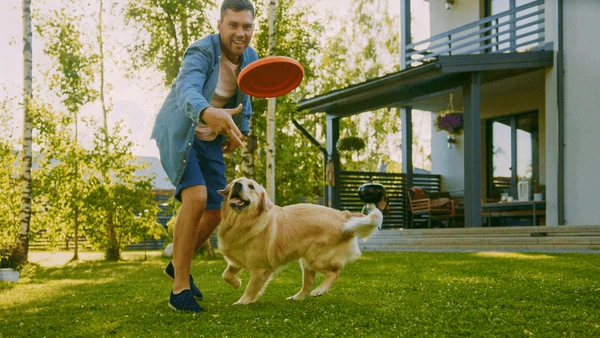Ensuring your dog leads a long and healthy life is not just about providing the basics—it requires a comprehensive approach that includes balanced nutrition, regular exercise, mental stimulation, and consistent medical care. Dogs, like humans, depend on a combination of factors to thrive, and understanding what contributes to their well-being can significantly extend their lifespan. By paying attention to their diet, activity levels, emotional needs, and medical health, you can offer your dog a better quality of life and increase their chances of living longer.
Balanced Nutrition for Longevity
A cornerstone of any dog’s long-term health is a proper diet, tailored to their age, breed, and lifestyle. Just as humans need different nutrition at various stages of life, dogs require specific types of food depending on whether they are puppies, adults, or seniors. Puppies need more calories and nutrients to support their rapid growth, while senior dogs benefit from food that supports joint health and mobility. Understanding your dog’s individual needs is the first step toward promoting longevity.
Additionally, supplements can play a crucial role in supporting long-term health, especially as your dog ages. Omega-3 fatty acids, glucosamine, and probiotics can support everything from joint mobility to digestive health and coat condition. However, it’s essential to consult with a veterinarian before introducing supplements to ensure they are appropriate for your dog’s specific health conditions. Keeping your dog at a healthy weight is another critical component. Obesity is a common issue that can shorten a dog’s life by contributing to joint issues, heart disease, and diabetes. Avoid overfeeding and be mindful of portion sizes to ensure your dog stays fit and active.
Regular Exercise and Mental Stimulation
Once you’ve established a balanced diet, regular exercise becomes the next essential aspect of your dog’s care. Exercise isn’t just about burning calories—it’s key to maintaining a healthy heart, strong muscles, and a robust immune system. Dogs, depending on their breed and age, require varying levels of physical activity, and it’s important to tailor your dog’s exercise routine accordingly. Breeds like Border Collies and Labradors may need more vigorous activity, while smaller breeds or senior dogs might benefit from gentler walks or play.

Beyond physical health, mental stimulation plays a significant role in your dog’s overall well-being. Dogs are intelligent animals that thrive on problem-solving and learning. Engaging their minds through puzzle toys, obedience training, and interactive games keeps their cognitive functions sharp. This is particularly important as dogs age, as mental stimulation can help stave off cognitive decline. Together, physical exercise and mental challenges contribute to a healthy body and mind, setting the foundation for a long life.
Preventative Healthcare and Regular Vet Visits
While a nutritious diet and regular exercise provide a strong foundation, preventative healthcare is just as crucial in ensuring a long and healthy life for your dog. Routine vet checkups allow for early detection of any potential health issues, giving you the opportunity to address them before they become more severe. Annual wellness exams typically include a full physical, blood tests, and a discussion about any changes in your dog’s behavior, weight, or energy levels. These checkups are vital in keeping your dog up to date with vaccinations and overall health monitoring.
In addition to routine checkups, keeping your dog protected against parasites such as fleas, ticks, and heartworms is crucial. Parasite prevention helps your dog avoid discomfort and potential health problems, such as Lyme disease or heartworm infections. Another essential aspect of preventative care is dental hygiene. Poor oral health can lead to gum disease, tooth loss, and systemic infections that can affect your dog’s organs. Regular brushing, dental chews, and professional cleanings can help maintain healthy teeth and gums, reducing the risk of more serious health issues.
Managing Stress and Anxiety
Just like humans, dogs are affected by their emotional environment, and stress can have a negative impact on their overall health. Chronic stress or anxiety can weaken a dog’s immune system, making them more susceptible to illness and reducing their quality of life. It’s important to create a stable, nurturing environment where your dog feels secure and loved. Consistent routines, plenty of attention, and appropriate socialization can help reduce anxiety and keep your dog emotionally healthy.
There are many techniques to alleviate stress in dogs, including regular physical activity, calming supplements, and interactive play. Dogs need a balance of both rest and activity, and ensuring they have a quiet, peaceful space at home can also reduce their stress levels. This emotional well-being is closely linked to their physical health, as dogs that experience less stress are more likely to live longer, healthier lives.
Grooming and Hygiene
Grooming is often overlooked but plays a significant role in keeping your dog healthy. Regular grooming sessions help keep your dog’s coat clean, remove dirt and debris, and prevent mats, especially for long-haired breeds. Grooming also provides an opportunity to check for any skin abnormalities, parasites, or infections that may require medical attention. Keeping your dog’s coat healthy through regular brushing distributes natural oils, promoting a shiny coat and preventing skin issues.
Bathing your dog should be done periodically, but not too often, as over-bathing can strip the skin of its natural oils. When you do bathe your dog, using a gentle, dog-friendly shampoo is important to avoid irritation. Drying your dog thoroughly after baths and ensuring they don’t stay damp helps avoid skin problems, especially in colder months. A clean dog is not only more comfortable but also less prone to skin infections and irritations, both of which can impact overall health.
Socialization and Companionship
While physical and mental health are essential, the social and emotional well-being of your dog also plays a vital role in their longevity. Early socialization with other dogs, people, and various environments can lead to a well-rounded, confident dog. Dogs that are properly socialized are less likely to develop behavioral problems and are generally more relaxed and happy in different situations. Maintaining companionship and socialization throughout their life ensures that your dog continues to thrive emotionally.

Having a strong bond with their owner is one of the most important aspects of a dog’s emotional health. Dogs are social animals that thrive on companionship and interaction with their family. Spending time with your dog, playing, and engaging in activities together strengthens this bond and contributes to their overall happiness, which is directly linked to a longer, healthier life.
Special Considerations for Senior Dogs
As your dog ages, their needs will naturally change, requiring you to adapt your care routine accordingly. Senior dogs may develop arthritis or other mobility issues, making it necessary to adjust their exercise routine to lower-impact activities. Similarly, their dietary needs may shift, requiring food formulated for senior dogs that supports joint health and maintains a healthy weight.
Making your home more accessible for an aging dog can also contribute to their comfort and longevity. Providing orthopedic beds, ramps, or stairs for easier access to furniture or cars can help prevent injuries and reduce joint strain. Regular vet visits become even more important in a senior dog’s life, with more frequent health screenings to catch any age-related issues early.
Helping your dog live a long and healthy life requires a holistic approach that encompasses proper nutrition, exercise, medical care, and emotional well-being. By being proactive in your dog’s care, providing them with a balanced diet, regular physical and mental stimulation, and consistent vet visits, you are giving them the best chance to live a long and happy life. From puppyhood to their senior years, your commitment to their health will not only extend their lifespan but also ensure that their life is filled with joy, vitality, and love.

After 5 years in a high pace business management role, I partnered with an e-commerce developer to start building Dog Supplies Warehouse.
Our number one goal is to make sure all products are managed and delivered to our customers door fast and accurately.
